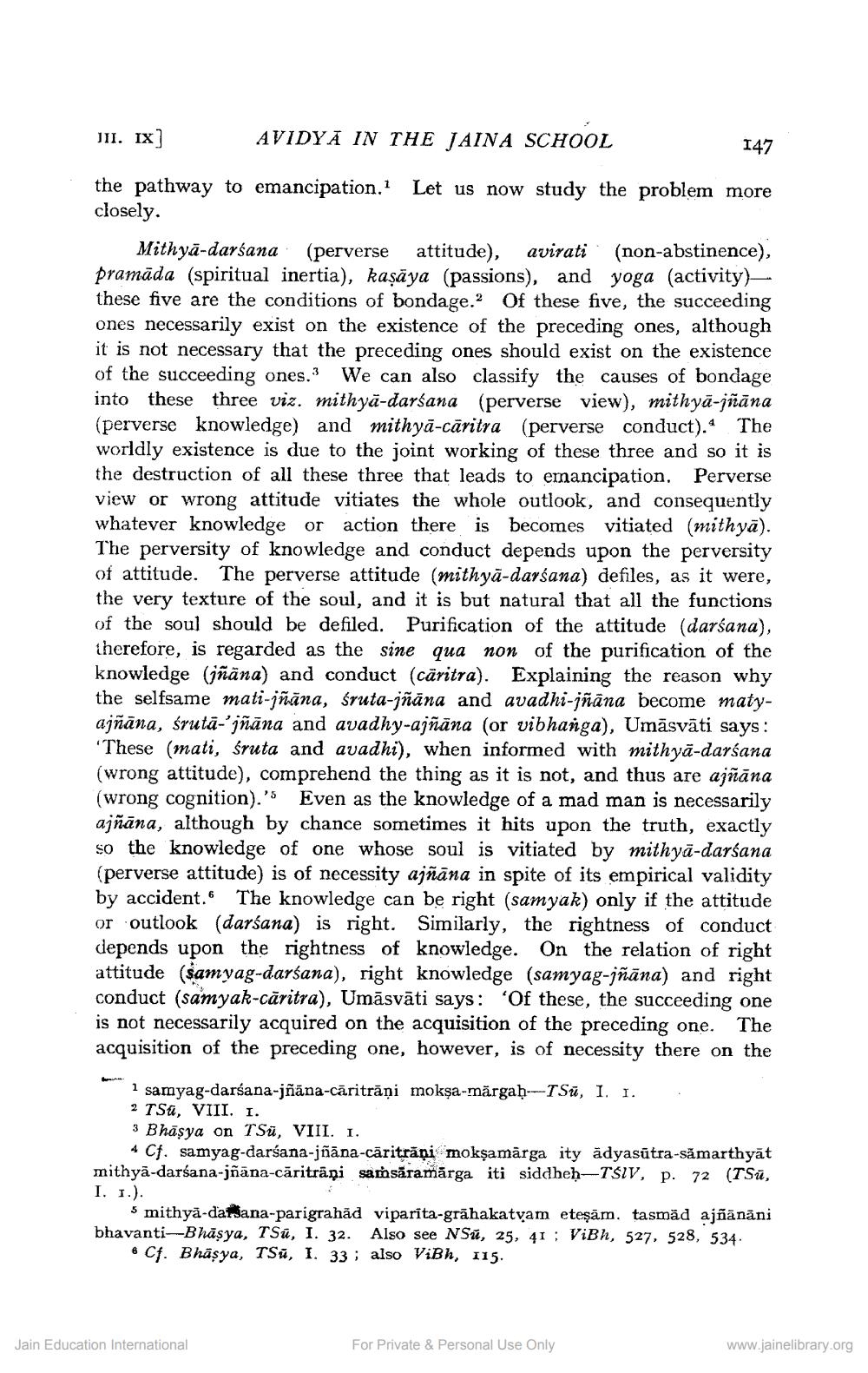________________
JII. IX]
AVIDYĂ IN THE JAINA SCHOOL
147
Let us now study the problem more
the pathway to emancipation. closely.
Mithya-darśana (perverse attitude), avirati (non-abstinence), pramāda (spiritual inertia), kaşaya (passions), and yoga (activity) these five are the conditions of bondage. Of these five, the succeeding ones necessarily exist on the existence of the preceding ones, although it is not necessary that the preceding ones should exist on the existence of the succeeding ones. We can also classify the causes of bondage into these three viz. mithya-darśana (perverse view), mithya-jñāna (perverse knowledge) and mithya-căritra (perverse conduct). The worldly existence is due to the joint working of these three and so it is the destruction of all these three that leads to emancipation. Perverse view or wrong attitude vitiates the whole outlook, and consequently whatever knowledge or action there is becomes vitiated (mithyā). The perversity of knowledge and conduct depends upon the perversity of attitude. The perverse attitude (mithya-darśana) defiles, as it were, the very texture of the soul, and it is but natural that all the functions of the soul should be defiled. Purification of the attitude (darśana), therefore, is regarded as the sine qua non of the purification of the knowledge (jñāna) and conduct (caritra). Explaining the reason why the selfsame mati-jñāna, śruta-jñāna and avadhi-jñāna become matyajñāna, śrutā-'jñāna and avadhy-ajñāna (or vibhanga), Umāsvāti says: *These (mati, śruta and avadhi), when informed with mithya-darśana (wrong attitude), comprehend the thing as it is not, and thus are ajñāna (wrong cognition).'s Even as the knowledge of a mad man is necessarily ajñāna, although by chance sometimes it hits upon the truth, exactly so the knowledge of one whose soul is vitiated by mithyā-darśana (perverse attitude) is of necessity ajñāna in spite of its empirical validity by accident. The knowledge can be right (samyak) only if the attitude or outlook (darśana) is right. Similarly, the rightness of conduct depends upon the rightness of knowledge. On the relation of right attitude (samyag-darśana), right knowledge (samyag-jñāna) and right conduct (samyak-căritra), Umāsvāti says: 'Of these, the succeeding one is not necessarily acquired on the acquisition of the preceding one. The acquisition of the preceding one, however, is of necessity there on the
1 samyag-darśana-jñāna-cāritrāņi mokşa-mărgaḥ---ISū, I. I. . 2 TSU, VIII. I. 3 Bhāsya on TSü, VIII. 1.
4 Cf. samyag-darśana-jñāna-cāritrāņi mokşamārga ity adyasūtra-sămarthyāt mithya-darśana-jñāna-căritrāņi samsāramārga iti siddheḥ-Tsiv, p. 72 (TSü, I. 1.).
Smithya-dardana-parigrahād viparita-grāhakatvam eteşām, tasmad ajñānāni bhavanti-Bhāşya, TSú, I. 32. Also see NSú, 25, 41 : Vibh, 527, 528, 534
6 Cf. Bhäşya, TSú, I. 33 ; also Vibh, 115.
Jain Education International
For Private & Personal Use Only
www.jainelibrary.org




